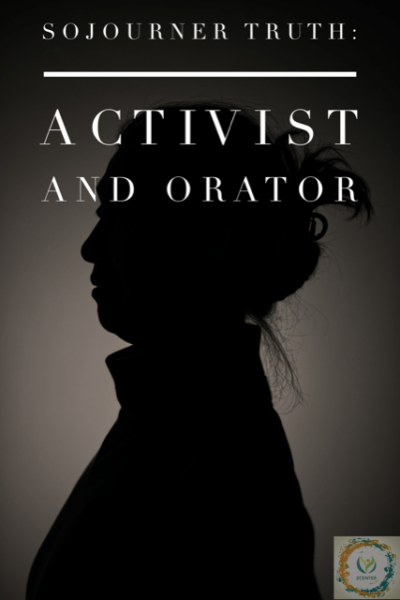Sojourner Truth lived as an enslaved Black woman for most of her young adult life until a New York statute declared in 1817 that all enslaved Black people would be free by July 4, 1827. Growing up as an enslaved Black girl, and in a rural town, Sojourner was never given the opportunity to attend missionary school to learn to read and write. It was not illegal to teach enslaved Black people during this time, although it was uncommon and typically occurred in more populated cities like New York City or Albany. Sojourner never did learn to read and write, but was a skilled orator who captivated audiences. Upon legally being granted her freedom, Sojourner was an avid abolitionist whose focus was on issues such as property rights, prison reform, capital punishment, and women’s suffrage. Sojourner teamed together with other activists to help add more power to the abolitionist movement including Frederick Douglass, even though they had differing ideas on how to help newly freed Black people during the time of Reconstruction. Partnerships like this one added even more power to the work of social justice as they continued to give speeches across the United States fighting for equal rights.
Sojourner Truth gave her now-famous speech, Ain’t I a Woman, in 1851 at the Ohio Rights Convention. In 2021, 170 years later, we see the relevancy of her words as they echo down the streets where we see police violence towards Black bodies. Ain’t I a Woman, cries Breonna Taylor, Ain’t I a Woman, cries Sandra Bland. Ain’t I a Woman, cry the many Black women whose lives have been cut short in recent years.
“Well, children, where there is so much racket there must be something out of kilter. I think that ‘twixt the Negroes of the South and the women at the North, all talking about rights, the white men will be in a fix pretty soon. But what’s all this here talking about?
That man over there says that women need to be helped into carriages, and lifted over ditches, and to have the best place everywhere. Nobody ever helps me into carriages, or over mud-puddles, or gives me any best place! And ain’t I a woman? Look at me! Look at my arm! I have ploughed and planted, and gathered into barns, and no man could head me! And ain’t I a woman? I could work as much and eat as much as a man – when I could get it – and bear the lash as well! And ain’t I a woman? I have borne thirteen children, and seen most all sold off to slavery, and when I cried out with my mother’s grief, none but Jesus heard me! And ain’t I a woman?
Then they talk about this thing in the head; what’s this they call it [member of audience whispers, “intellect”] That’s it, honey. What’s that got to do with women’s rights or Negroes’ rights? If my cup won’t hold but a pint, and yours holds a quart, wouldn’t you be mean not to let me have my little half measure full?
Then that little man in black there, he says women can’t have as much rights as men, ‘cause Christ wasn’t a woman! Where did your Christ come from? Where did your Christ come from? From God and a woman! Man had nothing to do with Him.
If the first woman God ever made was strong enough to turn the world upside down all alone, these women together ought to be able to turn it back, and get it right side up again! And now they is asking to do it. The men better let them.
Obliged to you for hearing me, and now old Sojourner ain’t got nothing more to say.
Sojourner Truth’s words speak to women of color today, too. This speech focuses not only on sexism but also racism within the feminist movement. All women should be treated equally to each other, and equally to men. The struggle of Black women finding their place as Black women within feminism and as feminist women within the Black community is an ongoing struggle, as we see in bell hooks’ Ain’t I a Woman: Black Women and Feminism. Sojourner Truth was a bold, brave woman who was not afraid to speak her mind against the injustices of the time. She overcame many obstacles in her life and made waves with her powerful words that battled patriarchy and racism.
Written by Olivia Stueben, Outreach Intern
All ZCenter blog posts are written by state certified staff, interns, and volunteers. For questions on authorship or content, please email kjones@zcenter.org.

